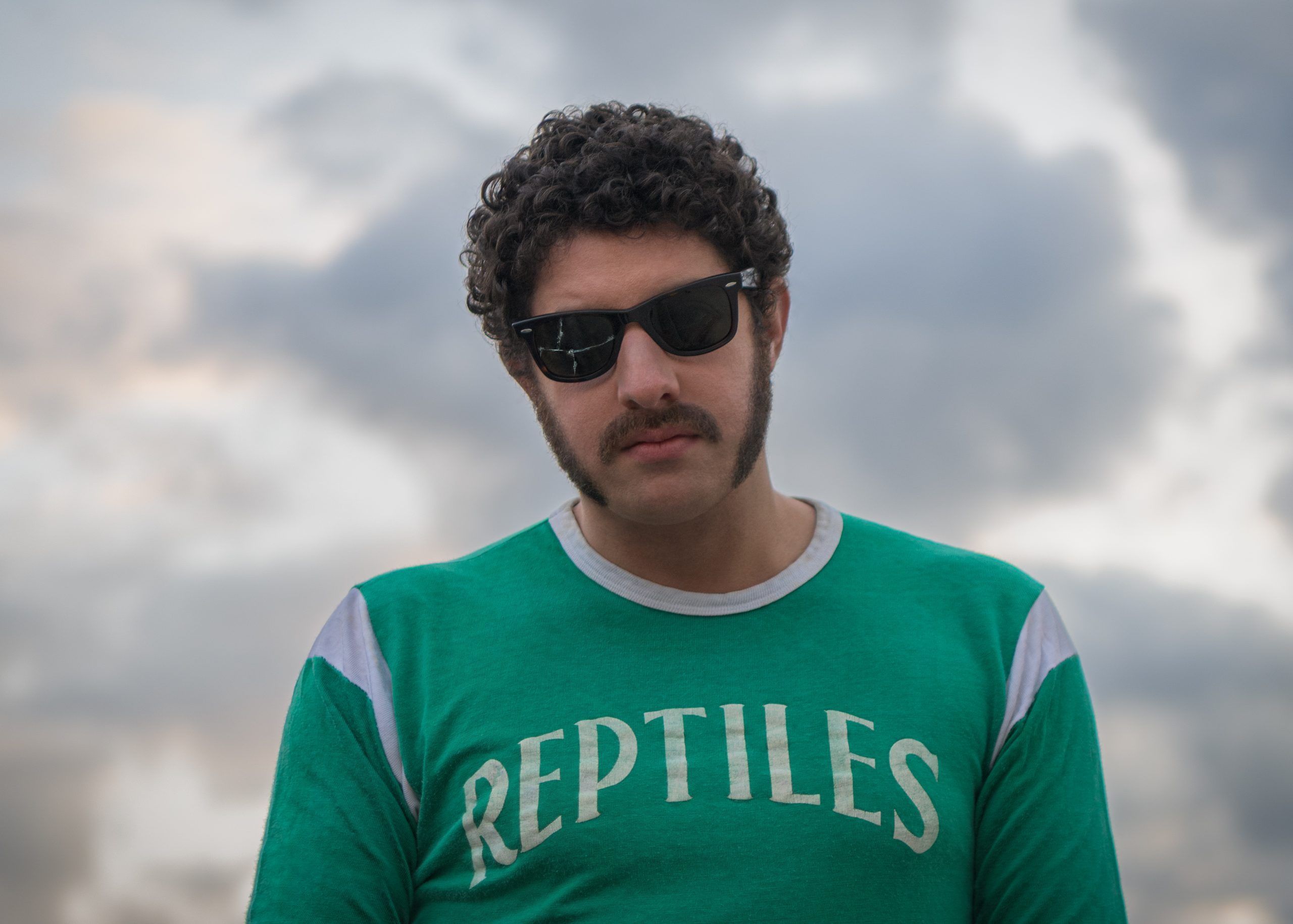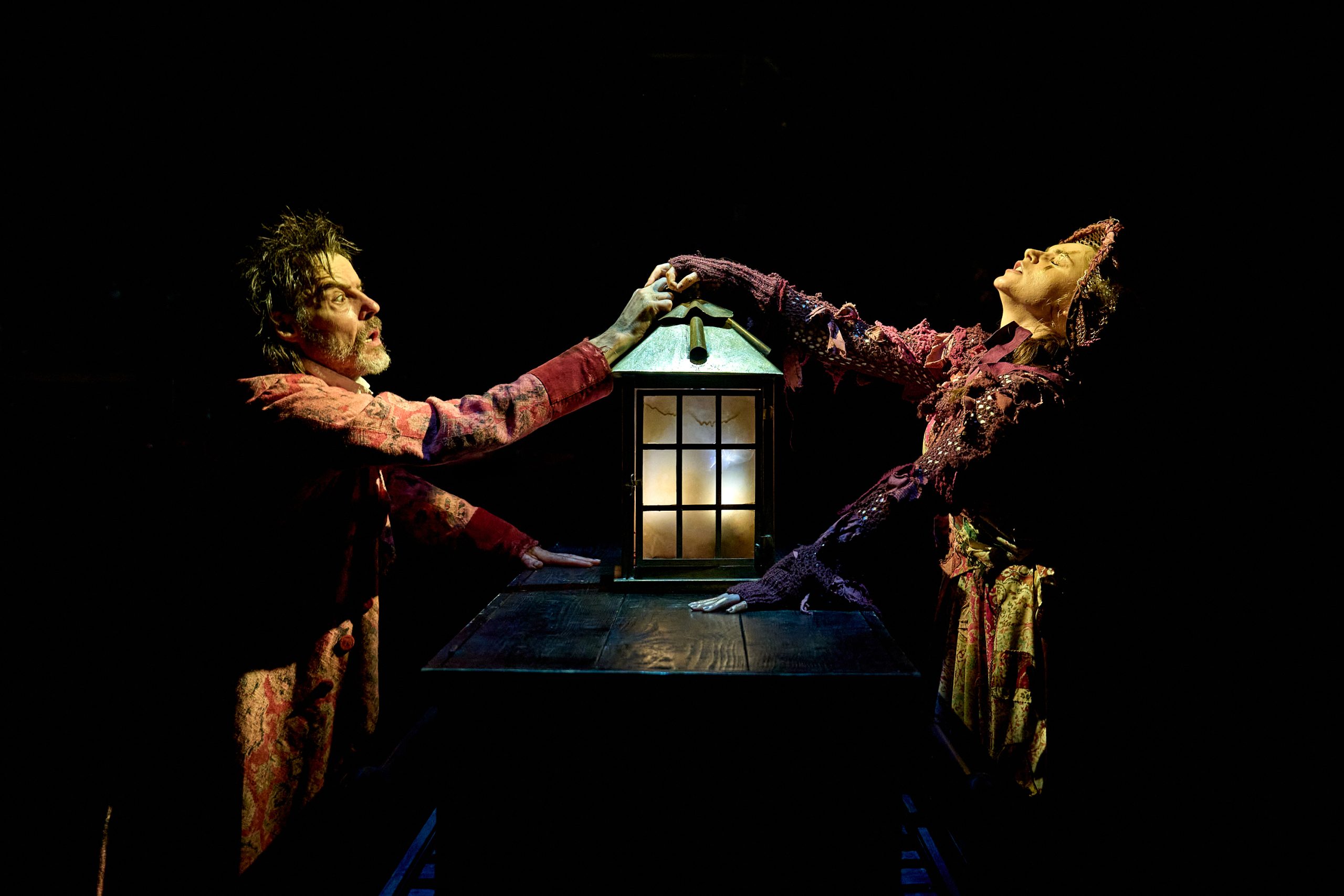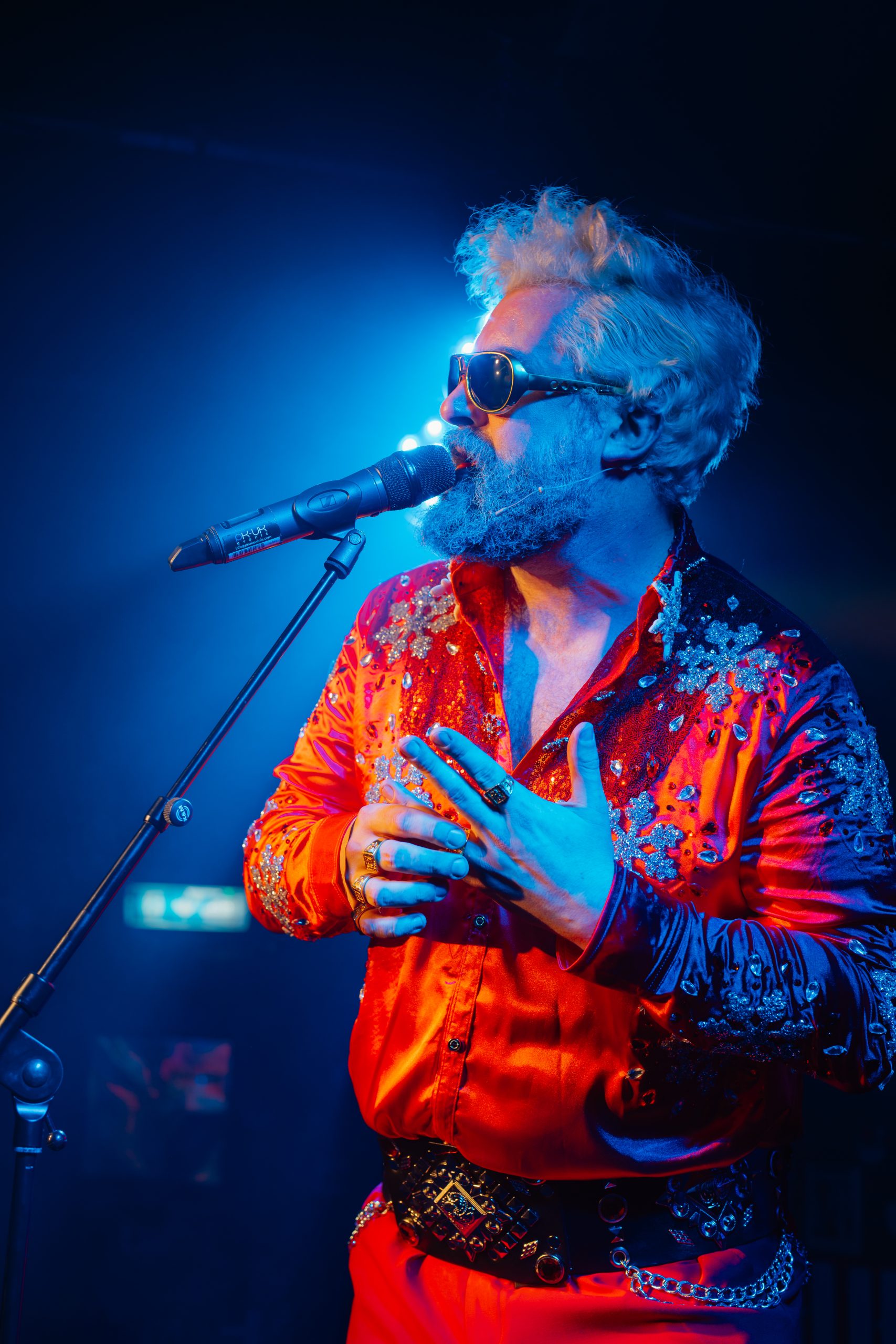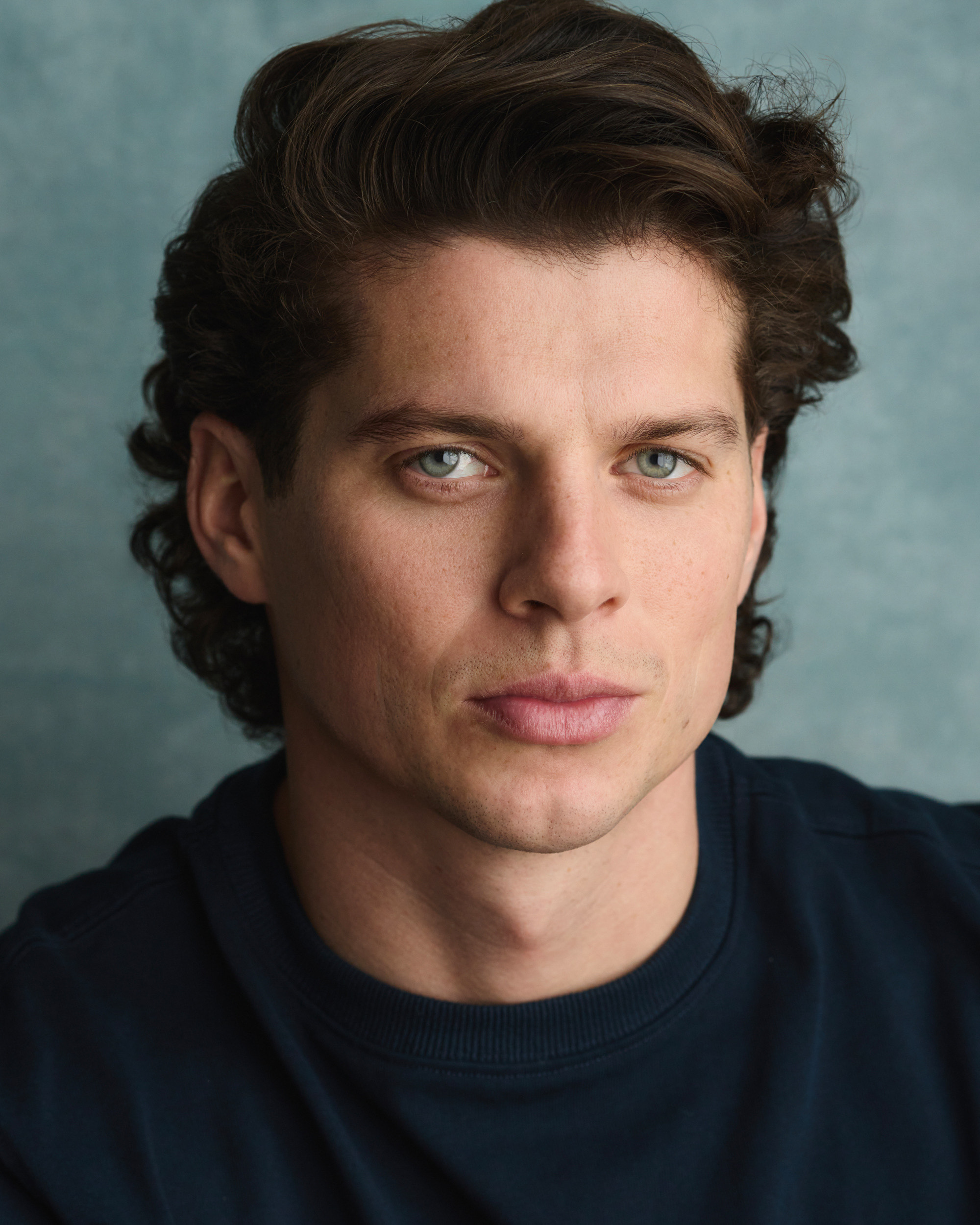If you’ve been anywhere near the theatre scene in the last year, chances are you’ve heard the buzz around Stereophonic. Fresh off its Tony-winning Broadway run, David Adjmi’s quietly electrifying play has just landed in the West End – and among the original cast members making the leap across the Atlantic is Eli Gelb. Known for his work on stage and screen, Gelb earned a Tony nomination for his performance as Grover, the band’s quietly pivotal sound engineer. We sat down to talk about rock bands, mixing desks, ADHD, and why this play is his favourite thing.
Hi Eli, Loving the look – very 70s. Is that for the show?
Yeah, it’s been a fun moment in my life to have this look. When we did it in New York, I had long hair, but we’ve been doing the show for about a year and a half now, and I just needed a break. So, I cut my hair, shaved… and then ended up growing the moustache and sideburns back. We’ve got a wig now, for the show.
It’s not what I’d normally choose, but I’m enjoying this look.
How’s the first week been in London?
It’s been great. Previews are always revealing – we’re still refining things with the director and tech team, while absorbing so much from the audience.
Has anything surprised you about how British audiences are responding compared to New York?
A bit. UK audiences are more reserved – which I expected – but there’s a genuine reverence for theatre here that feels different. It’s great that the arts are subsidised and tickets more accessible – theatre feels more democratic.
The engagement here is quieter, more reflective. You really feel them listening.
In the US, standing ovations are expected – which makes them kind of meaningless. And if you’re the only one sitting, you feel like the asshole. So, you stand. But here, if an audience stands – it actually means something. I like that.
I’m one of those people who’ll stand first if I love something – someone’s got to start it. I’m the ADHD guy in the room who doesn’t mind jumping up.
Cool. Same here – I’ve got ADHD too. It’s shaped a lot of my life. I’m often not inhibited – which can be a positive thing. It lets you be an instigator for good, like you standing up and saying: this is worth celebrating.
And risk being the only one doing it.
That’s right.
I appreciate that you’re reading the British audiences generously – it’s not that we’re cold, just more reflective.
Totally. What helps is knowing how strong this play is. It’s like going on a date – if you’re secure in yourself, it’s fine if it doesn’t click. This play gives me that kind of confidence. Even if we don’t get the perfect reaction, I know it has the goods.
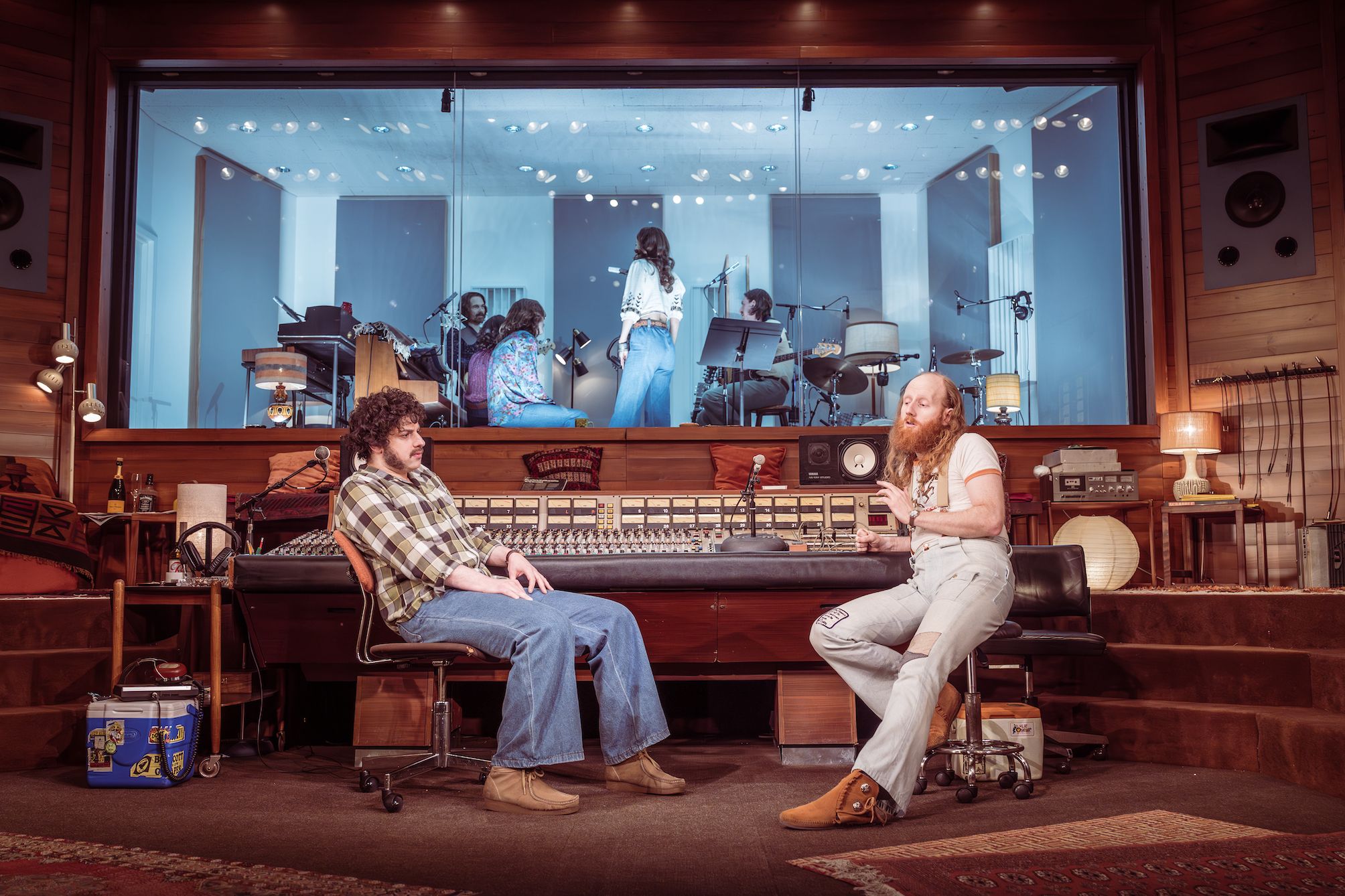
Do you think your Tony nomination helped with that confidence?
It was a huge landmark for me, and I was thrilled to be nominated – but I wouldn’t say it’s the source of my confidence. Those awards can be a little political, and while you do need to be operating at a certain level, what really gives me confidence is this play.
It’s something David Adjmi and the team – Will, Daniel, Justin, David Zinn, Ryan Rumery – built over ten years. It comes from such a rich, deeply considered place. When I first read it, I felt it. Everyone involved does. You just want to do it justice – to let it sing the way it sang to you.
For me, it’s the most meaningful thing I’ve ever worked on. There’s so much in it to keep discovering. That’s what grounds me.
When you said it was political, I made a face – like, don’t downplay it! But I can see you do own it, and that’s good.
Yeah, I picked up on that – and I appreciate the pushback. It really is exciting.
That was just my ADHD complete lack of poker face.
Also a good thing, I believe.
You’re playing Grover, the sound engineer. What kind of person is he, and how did you first connect with the role?
In every collaborative art form, there are people who are essential to the final product but rarely celebrated – in theatre, it might be stage managers, stagehands, associate designers. In the world of music production, especially with 70s rock bands – these larger-than-life rock gods – it’s the audio engineer. That’s who Grover is.
The story follows seven people: five rock stars, an assistant engineer, and Grover. He’s central to the process but often treated like he’s on the sidelines. It’s a unique position to occupy in a play – and a fun one to play. He’s an artist, really. But one who doesn’t get much credit for it. And I think that’s core to who he is and where he sits in the story.
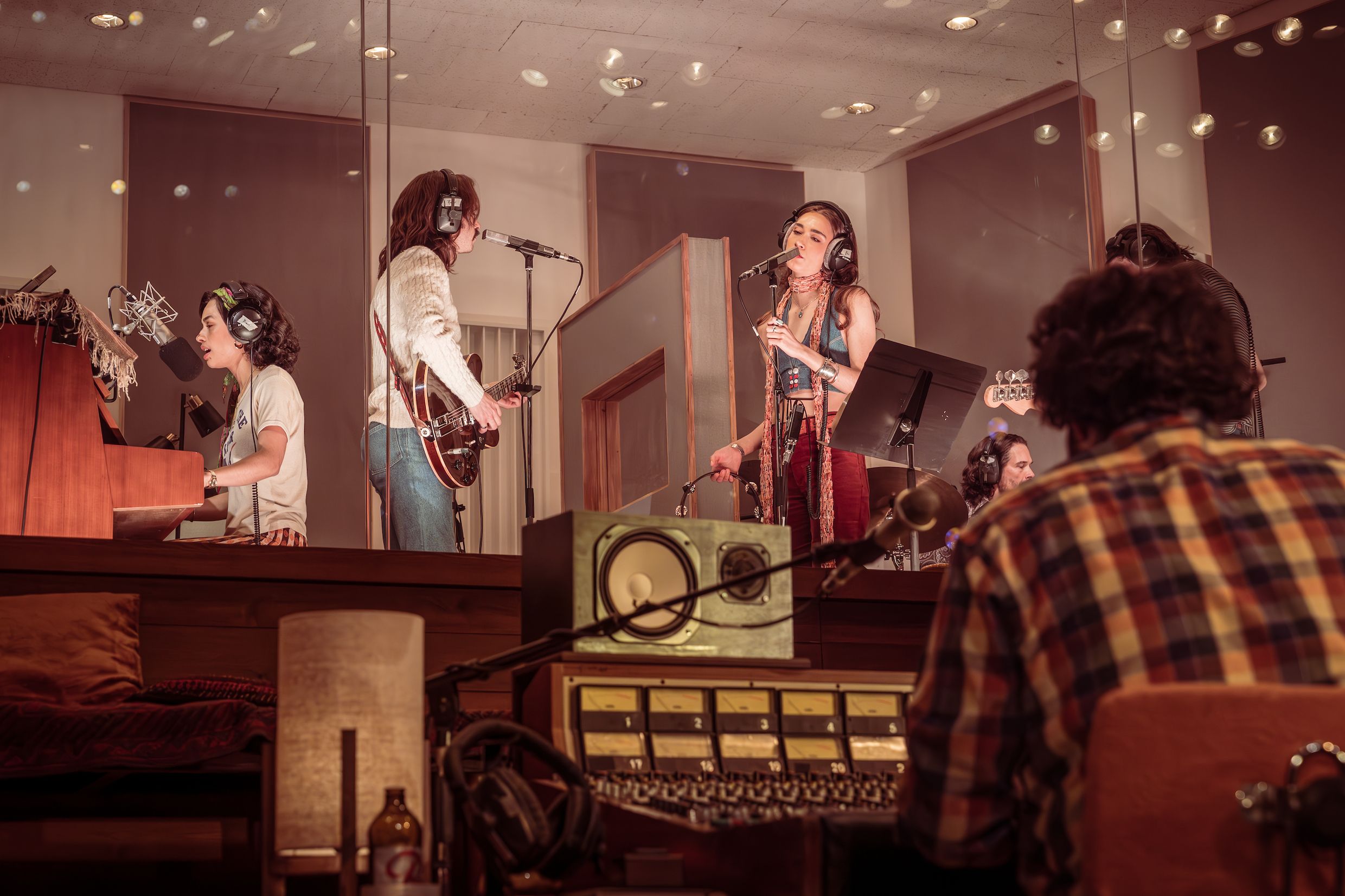
How did that help you connect with Grover personally?
I think all artists – and really all people – go through a cycle of aspiration. You want more for yourself, and you want to offer something to the world. Sometimes you feel down on yourself, but in the moments you don’t, there’s this feeling of: I have something to give, and I haven’t had the chance to give it yet.
I started acting when I was ten. It came from me – not my parents. I took a class, then did a showcase, got representation… but it was slow going for a long time. This is the first role I’ve connected to so deeply – as both an artist and a person. I feel seen by it. It lets me give everything, and speak to the audience about being alive.
Grover wants to give something to the world but hasn’t had the chance – that hunger and frustration really resonate with me. He’s full of duality – confident and unsure – and that tension feels very familiar. Feeling like you’ve got something to give, while feeling like a mess.
And he’s a humanist. He looks for the good, wants to nurture. His name, Grover, comes from someone who tends a grove – which perfectly fits his quiet care.
When you said the name Grover, I immediately thought of Sesame Street.
Right? I think that’s great – because Sesame Street was definitely on air at the time the play is set. I think it started around ’70 or ’71, and the play’s in ’76.
I’m sure Grover the sound engineer was very aware that the most present association with his name was a blue Muppet. Which is so funny. He actually has a moment early in the play where he’s listening to a song on headphones and sings along. The song’s called Is It My Name? by Todd Rundgren.
The lyrics go, ‘Why don’t you love me? Is it my name?’ And later: ‘You only love me for my machine.’ Which is really striking in the context of the sound board – and also what it means to be an artist. That feeling of being valued only for what you produce.
You only hear the line ‘Why don’t you love me?’ on stage – but the rest is in there. I’ve never asked David why he picked that song, but I think it’s really cool. There’s a lot of stuff like that in the play.
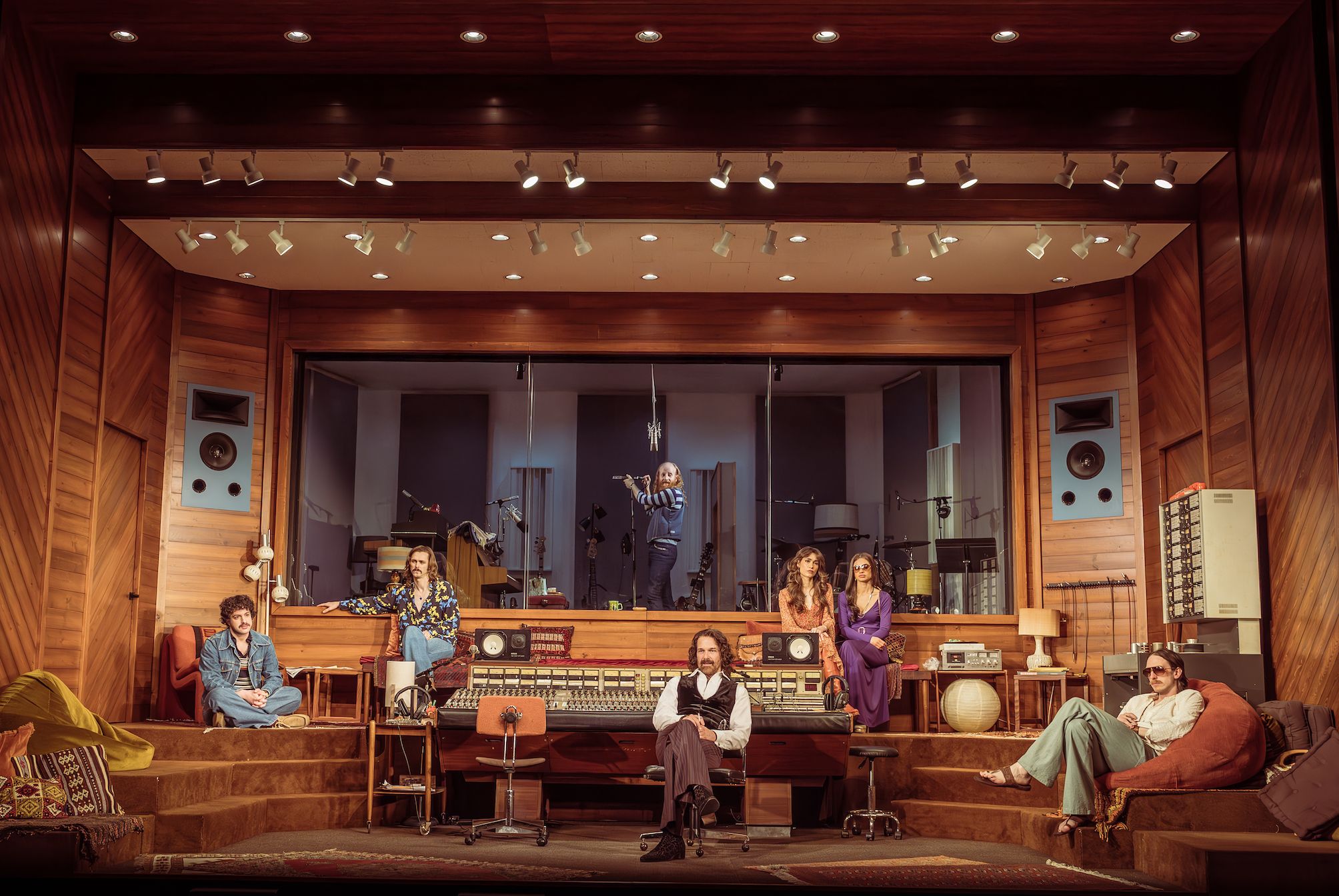
Grover’s often the quiet one in the room – more of an observer. How do you make that kind of presence resonate with an audience?
It’s a unique challenge – especially since I spend so much of the play with my back to the audience. I had to unlearn a lot of habits and find other ways to stay connected. I think of Grover as a conduit – events land on him before reaching the audience, like punctuation in the play’s rhythm. It’s about clarity and precision. I need to feel the moment, deconstruct it technically, then bring it back to life.
The whole play demands that kind of work. It looks naturalistic, but it’s incredibly exacting. David describes it as hyperrealism and an orchestral score – and that’s exactly what it is. It’s written in two columns: one for the control room, one for the live room behind soundproof glass. The overlaps are notated down to the syllable. You have to be a technician about it – but it still has to feel alive.
Does the whole show take place in the studio?
Yes – in studio.
The upstage area really is soundproof, behind glass, with period microphones from the 70s. Each instrument and each part of the drum kit is miked separately, exactly how it would have been in a studio at the time.
The actors playing the band members actually play their instruments live. When the band is laying down tracks, they’re doing full takes – and it’s all fed out into the house. In some moments, that exact audio is played back, just like it would be in a real studio – and what the audience hears is what was just performed live, moments before.
That level of detail with the equipment really got me – genuinely. My eyes welled up a bit. It just sounds so incredibly moving.
Right. It is so cool. And that’s how I feel about the whole play.
The costumes, designed by Enver Chakartash, are amazing – everyone talks about how cool and beautiful they are, but what gets overlooked is the character specificity. The storytelling built into them. Everything in this play has been treated with care – the lighting, the sound design. That sound design is the real magic trick. Ryan Rumery’s been involved for over a decade, even before the script was finished, because they had to figure out if it was even feasible. Same for the set – could you actually build a soundproof room on stage and feed sound from it live?
When you said that you welled up, it reminded me of a time I saw the New York City Ballet perform Glass Pieces – music by Philip Glass, choreography by Jerome Robbins. The orchestra was live, the dancers were incredible, the lighting, the costumes – everything. I wept. It was so beautiful – such a testament to human and artistic ingenuity. I think this play shares some of that same rigour. And that’s moving.
There’s clearly a real passion running through this – a drive to do it right and do it justice. How much of that comes from the director?
Oh, a huge amount of it. Daniel Aukin is really the source of that energy. He’s incredibly detail-oriented, but more than that, he’s deeply curious. He might have answers in his head, but he’s more interested in what might emerge – in the work, and in the people in the room.
That curiosity invites something special. You end up engaging with the work like a person, not just an artist machine. He welcomes everyone’s humanity, and that makes everything richer – especially for a play like this. We first worked together on Skintight, with Idina Menzel. We restaged it in LA about a year later, and a few months after that wrapped in 2019, I auditioned for Stereophonic. I didn’t know there was already an offer out at the time – I just came in and read for it. That audition was the day before the pandemic shut everything down.
When the show eventually came back around, the offer was open again. I reauditioned, and that’s how I got the part. I love working with Daniel. He’s a very special artist and person.
You’re working with real 1970s equipment, I hear. How much did you have to learn to make that look and feel really authentic?
Yeah – I definitely couldn’t mix an album, I’ll tell you that. But I do know what’s involved in mixing one now. I’ve got a rough understanding of how a sound console works, what the components are, and when I should be touching which dials and sliders.
I had the luxury of turning to Will Butler, our composer, and Justin Craig, our co-orchestrator and music director – both of whom work in recorded music and have produced things themselves. They answered a lot of questions. I also went down quite a few Wikipedia rabbit holes, read part of a memoir by the Beatles’ engineer, watched some documentaries.
It was definitely intimidating – especially because the sound console on stage is massive. It takes up about two-thirds of the stage and is meant to be something Grover knows like the back of his hand. But when we did the show at Playwrights Horizons off-Broadway, I saw that thing for the first time two weeks before we had an audience. So yeah, scary.
I also spoke to a couple of friends who work as engineers, and I’ve had people who work in studios come up to me after the show and say I fooled them – which is cool.
Yeah, that’s what you want, right? So the actors had to learn to play together like a real band. What was that rehearsal process like for you – someone on the technical side of the action, but still performing, while they’re actually playing?
It was a really different process for me. The first time we did the show off-Broadway, most of the band actors weren’t experienced musicians – they were actors first. This cast had a bit more experience going in, but back then, half of every rehearsal day was dedicated to band time. That meant they bonded in a really specific way, and I wasn’t part of that. Same for Andrew Butler, who plays the assistant engineer. In a way, that mirrored the show – Grover’s a bit isolated too.
Meanwhile, I was quietly panicking about how to make it all look convincing. That console is huge – it takes up two-thirds of the stage – and I only saw it for the first time two weeks before previews. I had to learn fast.
Grover’s someone who’s overstated his qualifications to get where he is, and I felt that. But I also love the music and the play so much. I’d show up early just to listen. I wanted that passion to show up in my performance – Grover cares, deeply. Watching the band come together was incredible. They went from barely playing to sounding like a real group. I remember them opening for Will Butler once, playing Masquerade, and I was in the audience. One lyric hit me hard – ‘I’ll see you when I get there.’
I felt behind at the time, and it was like they were singing to me. Like, we’re there now – you’ll catch up. It meant a lot.
You mentioned ADHD earlier – and when you talked about that last-minute pressure to figure out the equipment, I really felt that. Do you think that kind of pressure is actually what you need to push through?
Yeah, exactly. You do need that sometimes. But also, when you have ADHD, you tend to feel that uncertainty more deeply. I think everyone feels it to some extent, but ADHD adds an extra layer – because you usually need more time to process things.
At the same time, if you’ve lived with it for a while, you know the struggle. You’ve gone through it so many times that, as excruciating as it is, you start to develop a kind of wisdom about how you work. You learn patience – with yourself, and with the people around you.
I do see ADHD as a disability, but like any disability, there’s a kind of balance to it. You’re forced to become more aware – more generous – just to keep going. And with this show in particular, because the lift is so heavy, I think that helps.
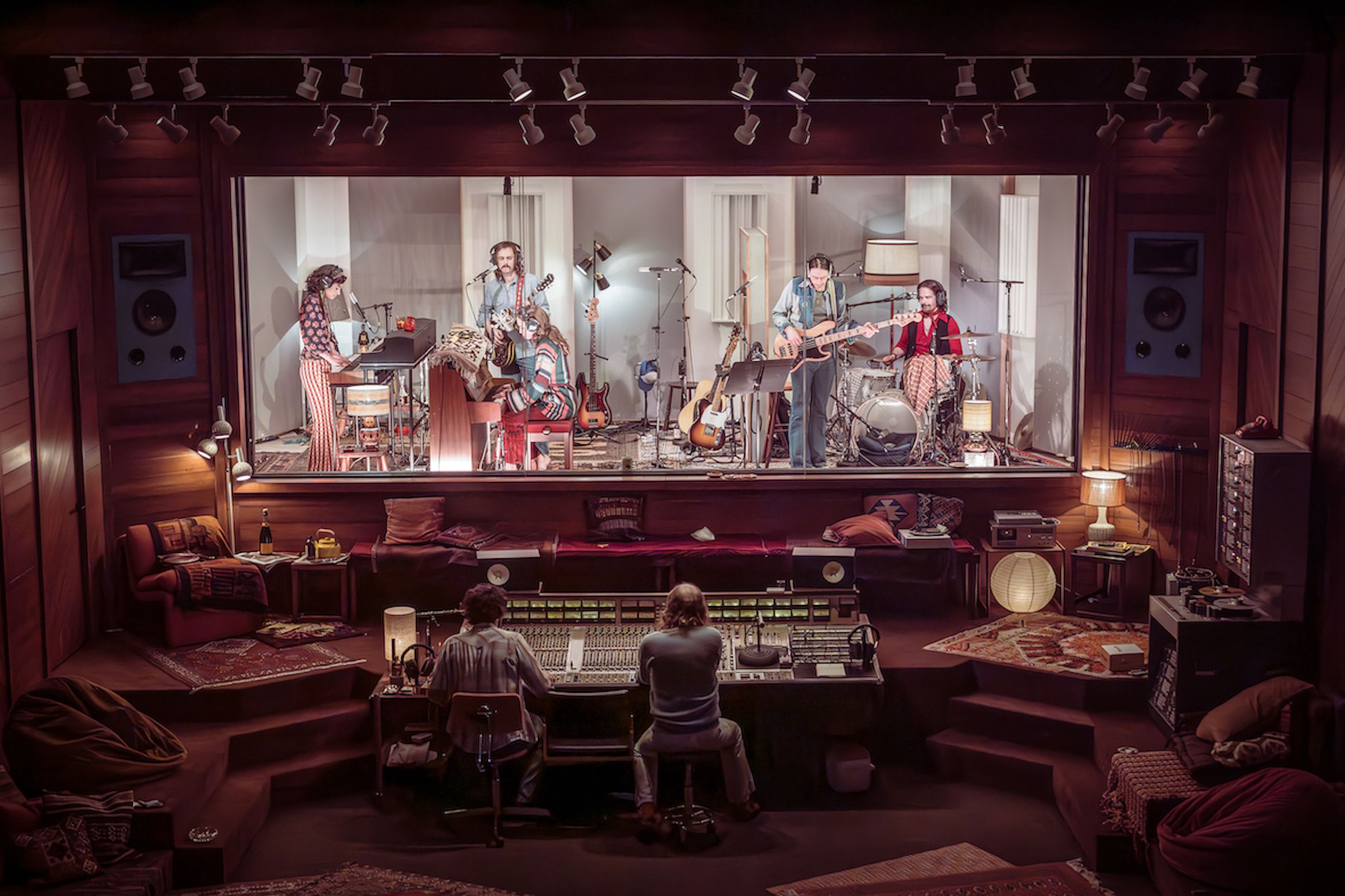
We’ve got four cast members who are new to the process, and sometimes I’ll talk to them and they’ll say, ‘I feel completely lost this week.’ And I can say, ‘Yeah, that’s exactly where you should be. You’ve just put the book down, you’re trying to feel the rhythm, but the words aren’t there yet. That’s normal.’
It’s like you go through these universal human struggles, but dialled up. And when you come out the other side, if you do, you have a great sense of empathy for others.
As someone with ADHD playing a sound engineer – someone who listens for a living – has it made you think differently about silence and subtlety?
It’s a good question. I think all actors need to have an appreciation of silence and subtlety, regardless of neurodivergence. It’s part of the craft. If everything’s urgent or loud or active, then nothing actually lands – you don’t hear the story.
But when it comes to Grover – yeah, I think he has ADHD. I do. His job is literally to mix an album, to take all these different tracks and frequencies and dynamics and turn them into one coherent product. I relate to that – I’m constantly processing everything around me, without much ability to filter. It’s overwhelming.
I also think, maybe because I’m the son of two therapists, I’ve always been encouraged to be open, to listen deeply. And I often find myself trying to process things on behalf of others too – not in a patronising way, I hope, but because it feels natural. In the world, like in this play, there are so many different dynamics happening at once, and sometimes they all end up in the same room. Grover’s job is to make something unified out of that mess. That’s how I try to relate to people too.
And as an actor, listening is a huge part of that. Every night I notice new things – a different rhythm in the text, a new tone in someone’s delivery, a little slip or unexpected moment – and I have to stay open to all of it. It’s this ongoing, high-speed juggling act to stay truly present. But that’s where the humanity is. That’s where Grover lives.
I cannot wait to see the play, Eli, and especially your performance.
Thank you for sharing with such passion.
My pleasure. I’m so excited about it all the time – it’s my favourite thing.
Stereophonic is playing at the Duke of York’s theatre, currently booking till October 11th, 2025.
Book your tickets at theatreticketsdirect.co.uk
Words by Nick Barr
Production Photography Marc Brenner
Portrait of Eli by Daria Blum

